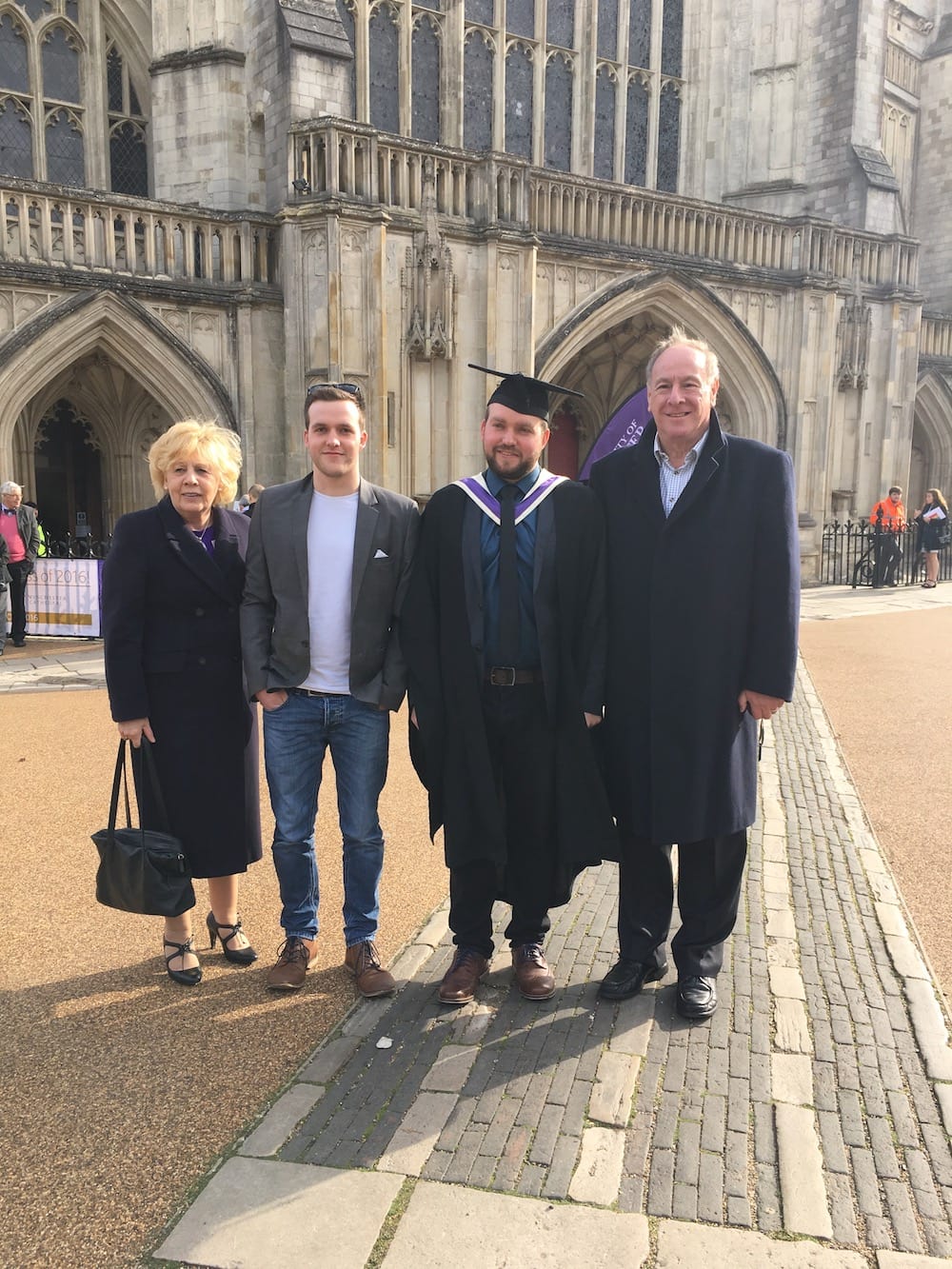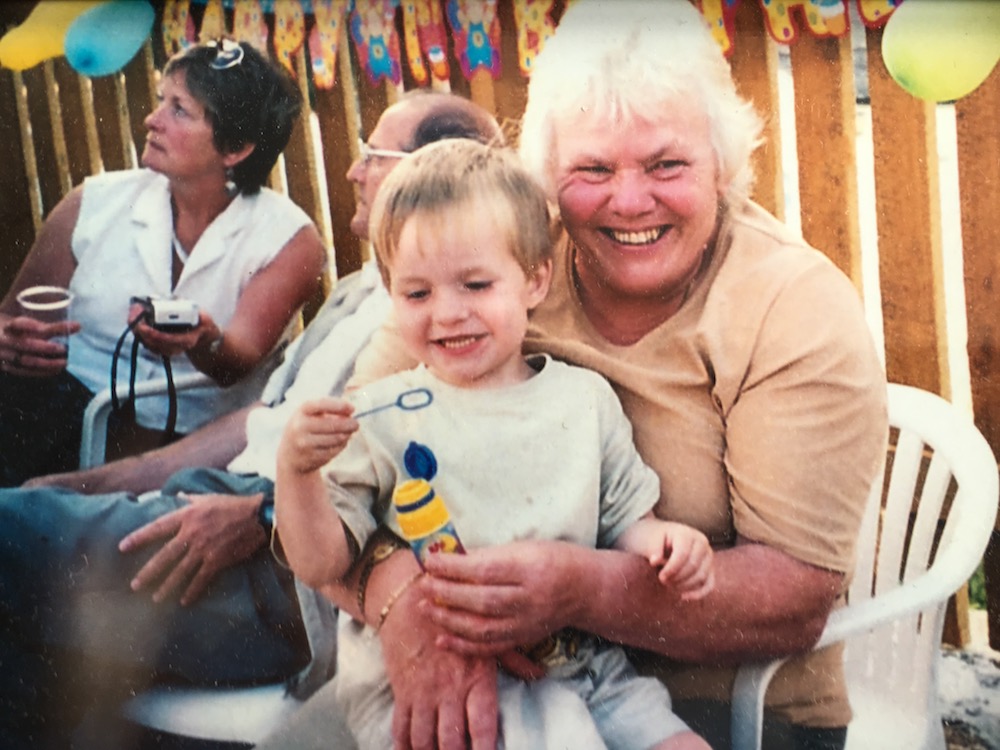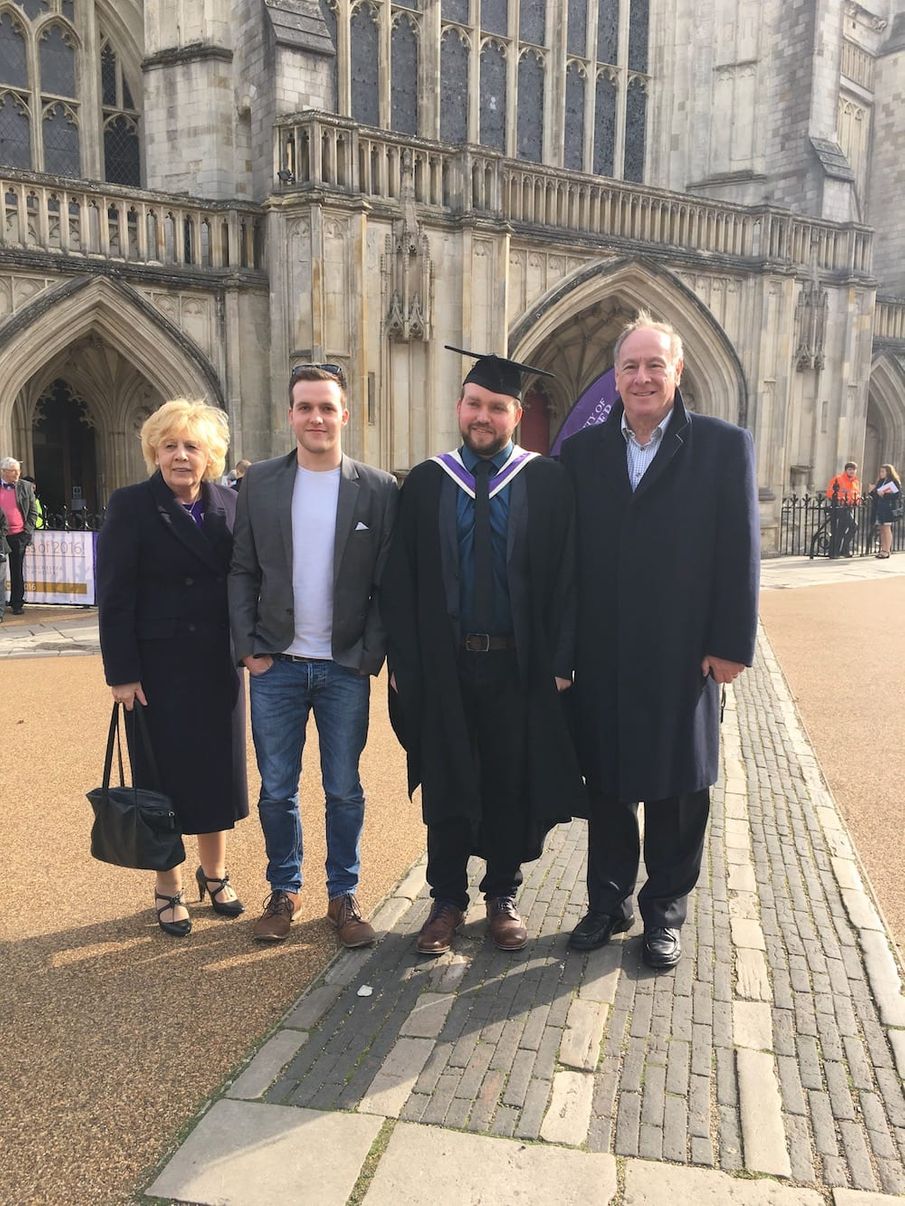Film enthusiast Harry Newman’s focus on his nan’s deteriorating health and his mother’s ability to cope meant that he missed another crisis that was just out of shot

In 2014, I had the worst year of my life. But first let’s rewind to June 2013. I’m a lucky man, and always have been. I have a close family, full of great people and characters. I’m blessed to have not needed for anything in my life, and because of this, I’d never really felt pain before. Believe me, being a spoiled brat as a kid, I knew how to throw a tantrum or pretend I was hurting by wallowing in self-pity, but I had never felt actual pain.
Most of my family live in Falmouth, on the southern coast of Cornwall. I have fantastic memories of running along Maenporth beach, playing rugby with my cousins, and watching the surfers with my brother. Every time we visited Cornwall, we’d stay with my nan – Elizabeth ‘Betty’ Levick. She was a hard Scouse woman. Because my mum was her only daughter, she was always a little harder on her and had higher expectations of her, and this seemed to run on in her expectations of me and my brother. This made me love my nan more. She was witty and stubborn, and she didn’t take sh*t from anyone.
I remember being sat in her front room on the third day of a long weekend, sprawled across her couch watching Eggheads – because that’s what we always watched at nan’s. She came through the living room door with my mum, both of them in tears.
My family is built on a matriarchy and always has been – well since I’ve been alive it has. So when we saw them enter in such a state, it was a shock. But as my brother, father and I began to get up to comfort them, my mum managed to wave us all down with a tear-soaked hand.
After a long silence, mum composed herself. Looking at me and my brother she said, “Your nan’s been diagnosed with ovarian cancer.”
With everything that went on, the hardest part of that year was that I did nothing to help my brother when he was spiralling
My long weekend became a five-day one, where we stayed with my nan to make sure she was set-up, and broke the news to my three uncles. No one seemed to take it well, but we all clung to the hope that she would pull through. We spent the following months travelling between where we live in Reading and Falmouth. It was almost every three weeks that we’d drive down to see my nan, talk to her and look after her.
Most weeks in between, my mum would go alone to take care of her. We all wanted to be there, but the strain of the journey would have had a heavy toll and my parents didn’t want it to affect our education. I could tell the travel and situation was affecting my mum, so I would do everything I could to help around the house.
Things became increasingly difficult for her, but she withheld how strong she was having to be because of how stubborn she is. After about three months, the doctors told us my nan was in remission, so my mum decided to take her to Rome, as it was one of the places she’d put on her bucket list. They were excited that everything was on the up and up, and that luck I carry around like a child’s toy seemed to have worked its magic once again – thank god.
We carried on visiting, but less frequently. During this time, one of my brother’s school friends had been murdered by her ex-boyfriend. We rarely talked at that point because he was off at uni, but when he came home I noticed that the hair on his forehead was beginning to thin. He would come into my room in the night, turn on my light and ask if his hair was disappearing. It was difficult to see my brother so unhappy. He was always popular in school – I could talk to most people from there, and if asked about my brother they’d always say how much they loved that guy. I looked up to him. He was a big influence in my following a shared passion in filmmaking. I was even jealous of his accomplishments at the time, though I know now he wholeheartedly deserves them. Afraid of hurting him, I lied.
The cancer was picked up again several weeks later. In early 2014 I was at sixth form. Sat in the cafeteria on a free period, I received a call from my mum. My nan had been taken into hospital and we had to leave that night. I went into my next lesson and told my teacher what was going on. It was the first time I had told my college about the situation. I jogged home, got my bags ready, got in the car and we got to the hospital by 7pm.

When we arrived, two of my uncles that lived in Falmouth, along with my cousins and aunts, were there by her side. My auntie Julie, took us in to see her. Nan was lying in bed, but didn’t seem to notice we were there. She was in too much pain.
We all went to her bedside and two-by-two we held her hand and said hello. My brother had always had a stronger connection with my nan than I had. He stood by her side, and began to weep as he spoke. It was at that point, when I saw my brother feeding water to my nan through a sponge to sooth her as he was talking to her, springing to attention for anything that needed to get done for her, I realised how much he had been hurting.
She died two days later.
My third uncle had arrived in time, and while all of her sons and daughters were sat in the room with her, I was with my youngest cousins – two 11-year-old twins, their older brother who was around 14, and their grandparents on their mum’s side. I’ll never forget when the call came through, and their granddad Barry turned to us to say she had passed. The twins burst into tears and me and my cousin held them. Barry pulled us all in together and held us.
I was sad, but I couldn’t bring myself to cry at that point. I was emotionally shocked. I felt angry that I wasn’t with the rest of my family at her side. But also sad and worried for my brother, mother and father.
We had to wait a few weeks before the funeral. My brother and I broke down when the casket came out. It was as if all the pain my family had been feeling suddenly rushed out in the form of me weeping in the front row.
One thing that did bring happiness to my day was the fact that the crematorium was full. When I couldn’t stop crying, no one said to stop or man-up. They came over and consoled us. I was stood next to my great uncle Tommy. He held my shoulder throughout the service, and I didn’t find out until later that he had also joined me in a symphony of hysterics.
After the service, I saw my brother more clearly and how much he had been hurt. There was a large hole left in him where my nan had once been.
I was sad, but couldn't bring myself to cry at that point. I was emotionally shocked
It was two months after the funeral that I saw my brother next, and realised who he’d become. I went to stay with him to help make a film. With everything going on in his life, my brother stopped taking care of himself at university, and away from a family distracted by grief, his need for help went unnoticed. When he finished uni and moved in with a friend, I could finally see clearly that something had been wrong. He was depressed.
I later found out his friends from Reading had bullied him for years. After the death of his friend and of our nan in such a short space of time, he had felt overwhelmed and completely stressed out. As this stress began to affect him physically, his hair thinned at the front and he’d seek validation that it wasn’t from various family members. We always lied, because we didn’t want to hurt him after he’d already hurt so much. But one afternoon, inebriated with him in his student squalor, I remember telling him the truth. He seemed to be a little relieved. He’d developed trust issues, thinking everyone was lying to him, and the paranoia had set in.
With everything that went on, the hardest part of that year was that I did nothing to help my brother when he was spiralling. I believed he would be fine. I was so caught up in everything that was going on, that I missed the signs of someone I loved who needed help more than ever.
Since then, I’ve spent the better half of two years phoning and texting him every week, and visiting him when I can. I can happily say that he’s doing better now – he has a group of good friends around him, he lives in his own apartment and, I think, he’s happy.
I will always regret not seeing his pain sooner.
If you have been affected by Harry’s story and want to talk with a professional, you can find a counsellor in your local area at counselling-directory.org.uk


Comments